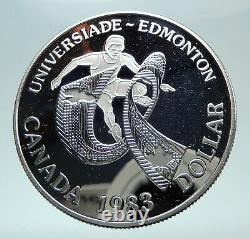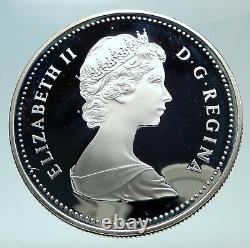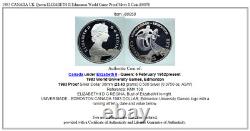1983 CANADA UK Queen ELIZABETH II Edmonton World Game Proof Silver $ Coin i80858




Item: i80858 Authentic Coin of. Queen: 6 February 1952-present 1983 World University Games, Edmonton 1983 Proof Silver Dollar 36mm (23.43 grams) 0.500 Silver 0.3750 oz. ASW Reference: KM# 138 ELIZABETH II D · G · REGINA, Bust of Elizabeth II to right.
UNIVERSIADE - EDMONTON CANADA 1983 DOLLAR, Edmonton University Games logo with a running athlete, date and value below. The Universiade is an international multi-sport event, organized for university athletes by the International University Sports Federation (FISU).
The name is a combination of the words "University" and "Olympiad". The Universiade is referred to in English as the World University Games or World Student Games ; however, this latter term can also refer to competitions for sub-University grades students. The Universiade is the largest multi-sport event in the world apart from the Olympic Games. The most recent games were in 2019: the Winter Universiade was in Krasnoyarsk, Russia while the Summer Universiade was held in Naples, Italy.
The 2021 Winter Universiade will take place in Lucerne, Switzerland, between 21 and 31 January 2021, and the 2021 Summer Universiade will be held in Chengdu, China between 8 and 19 August 2021. The idea of a global international sports competition between student-athletes pre-dates the 1949 formation of the International University Sports Federation (FISU), which now hosts the Universiade.
English peace campaigner Hodgson Pratt was an early advocate of such an event, proposing (and passing) a motion at the 1891 Universal Peace Congress in Rome to create a series of international student conferences in rotating host capital cities, with activities including art and sport. This did not come to pass, but a similar event was created in Germany in 1909 in the form of the Academic Olympia.Five editions were held from 1909 to 1913, all of which were hosted in Germany following the cancellation of an Italy-based event. At the start of the 20th century, Jean Petitjean of France began attempting to organise a "University Olympic Games". After discussion with Pierre de Coubertin, the founder of the modern Olympic Games, Petitjean was convinced not to use the word "Olympic" in the tournament's name. Petitjean, and later the Confederation Internationale des Etudiants (CIE), was the first to build a series of international events, beginning with the 1923 International Universities Championships.
This was followed by the renamed 1924 Summer Student World Championships a year later and two further editions were held in 1927 and 1928. Another name change resulted in the 1930 International University Games. The CIE's International University Games was held four more times in the 1930s before having its final edition in 1947. A separate group organised an alternative university games in 1939 in Vienna, in post-Anschluss Germany.The onset of World War II ceased all major international student sport activities and the aftermath also led to division among the movement, as the CIE was disbanded and rival organisations emerged. This event principally catered for Eastern European countries. After the closure of the CIE and the creation of the first UIE-organised games, FISU came into being in 1949 and held its own first major student sport event the same year in the form of the 1949 Summer International University Sports Week. The Sports Week was held biennially until 1955. Like the CIE's games before it, the FISU events were initially Western-led sports competitions.
Division between the largely Western European FISU and Eastern European UIE eventually began to dissipate among broadened participation at the 1957 World University Games. This event was not directly organised by either group, instead being organised by Jean Petitjean in France (which remained neutral to the split), but all respective nations from the groups took part. The FISU-organised Universiade became the direct successor to this competition, maintaining the biennial format into the inaugural 1959 Universiade. It was not until the 1957 World University Games that the Soviet Union began to compete in FISU events.
That same year, what had previously been a European competition became a truly global one, with the inclusion of Brazil, Japan and the United States among the competing nations. The increased participation ultimately led to the establishment of the Universiade as the primary global student sport championship.
Canada is a country, consisting of ten provinces and three territories, in the northern part of the continent of North America. It extends from the Atlantic to the Pacific and northward into the Arctic Ocean, covering 9.98 million square kilometres (3.85 million square miles) in total, making it the world's second-largest country by total area and the fourth-largest country by land area. Canada's common border with the United States forms the world's longest land border.
Canada is sparsely populated overall, the majority of its land territory being dominated by forest and tundra as well as the mountain range of the Rocky Mountains; about four-fifths of the population live near to the southern border. The majority of Canada has a cold or severely cold winter climate, but southerly areas are warm in summer. The land now called Canada has been inhabited for millennia by various Aboriginal peoples.
Beginning in the late 15th century, British and French colonies were established on the region's Atlantic coast. As a consequence of various conflicts, the United Kingdom gained and lost North American territories until left, in the late 18th century, with what mostly comprises Canada today. Pursuant to the British North America Act, on July 1, 1867, three colonies joined to form the autonomous federal Dominion of Canada. This began an accretion of provinces and territories to the new self-governing Dominion. In 1931, Britain granted Canada near total independence with the Statute of Westminster 1931 and full sovereignty was attained when the Canada Act 1982 severed the vestiges of legal dependence on the British parliament. Canada is a federal parliamentary democracy and a constitutional monarchy, Queen Elizabeth II being the current head of state.The country is officially bilingual at the federal level. It is one of the world's most ethnically diverse and multicultural nations, the product of large-scale immigration from many countries, with a population of approximately 35 million as of 2015.
Its advanced economy is the eleventh largest in the world, relying chiefly upon its abundant natural resources and well-developed international trade networks. Canada's long and complex relationship with the United States has had a significant impact on its economy and culture.
Canada is a developed country and one of the wealthiest in the world, with the tenth highest nominal per capita income globally, and the eighth highest ranking in the Human Development Index. It ranks among the highest in international measurements of government transparency, civil liberties, quality of life, economic freedom, and education. Canada is a Commonwealth Realm member of the Commonwealth of Nations, a member of the Francophonie, and part of several major international and intergovernmental institutions or groupings including the North Atlantic Treaty Organization, the G8, the Group of Ten, the G20, the North American Free Trade Agreement and the Asia-Pacific Economic Cooperation forum. World-renowned expert numismatist, enthusiast, author and dealer in authentic ancient Greek, ancient Roman, ancient Byzantine, world coins & more.
Ilya Zlobin is an independent individual who has a passion for coin collecting, research and understanding the importance of the historical context and significance all coins and objects represent. Send me a message about this and I can update your invoice should you want this method.Getting your order to you, quickly and securely is a top priority and is taken seriously here. Great care is taken in packaging and mailing every item securely and quickly. What is a certificate of authenticity and what guarantees do you give that the item is authentic? You will be very happy with what you get with the COA; a professional presentation of the coin, with all of the relevant information and a picture of the coin you saw in the listing. Additionally, the coin is inside it's own protective coin flip (holder), with a 2x2 inch description of the coin matching the individual number on the COA.
Whether your goal is to collect or give the item as a gift, coins presented like this could be more prized and valued higher than items that were not given such care and attention to. When should I leave feedback?
Please don't leave any negative feedbacks, as it happens sometimes that people rush to leave feedback before letting sufficient time for their order to arrive. The matter of fact is that any issues can be resolved, as reputation is most important to me. My goal is to provide superior products and quality of service. How and where do I learn more about collecting ancient coins?
Visit the Guide on How to Use My Store. For on an overview about using my store, with additional information and links to all other parts of my store which may include educational information on topics you are looking for.
This item is in the category "Coins & Paper Money\Coins: Canada\Dollars". The seller is "highrating_lowprice" and is located in this country: US. This item can be shipped worldwide.
- Certification: Uncertified
- Circulated/Uncirculated: Uncirculated
- Denomination: Denomination_in_description
- Year: Year_in_description

